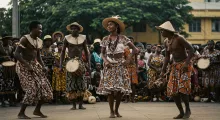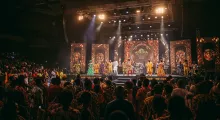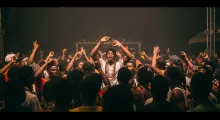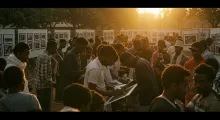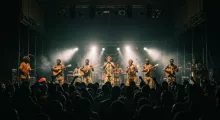The big picture—what Milege really is
The Milege World Music Festival (often styled Milégé) is a three-day, community-driven celebration of African music and culture that blends live bands, traditional ensembles, DJs, dance, food, crafts, and family activities—set against the shoreline breeze of Lake Victoria. Think of it as a welcoming, participatory festival rather than an arms-length mega-show: jam circles spill into the pathways, dance troupes teach steps to kids, and headliners are just as likely to wander the craft market after their sets as they are to leap straight into a bus. For 2025, organizers moved the event to the beach, and that choice changed the texture of the weekend: more sand-between-the-toes sunsets, more laid-back day sessions, and a literal stage-with-a-view. (Facebook)
2025 at a glance: After an initial June plan was postponed, the festival ran on August 1–3, 2025 at Tropical Beach, Garuga (Entebbe)—a short hop from town and adjacent to Country Lake Resort. If you saw older posts with June or even September windows, those were superseded by the lakeside August edition at the new beachfront venue. (Instagram, Facebook)
How we got here: a short history of Milege
Milege started as a band and cultural initiative in Kampala that fused Uganda’s regional traditions with contemporary arrangements—plenty of polyrhythms, call-and-response vocals, and a palette that embraced indigenous instruments (adungu, akogo, endongo, amadinda, etc.) alongside guitars, keys, and brass. That spirit naturally evolved into a festival in the early 2010s, with early showcases at Lake Victoria Serena and then an annual home at the Entebbe Botanical Gardens by mid-decade. Coverage from Ugandan outlets like Daily Monitor and The Observer charted the festival’s rise, its camping vibe, and lineups that mixed heritage acts with rising East African names. (Monitor, The Observer)
By 2014–2017 the brand had settled into a recognizable November cadence in the Botanical Gardens, occasionally spotlighting international collaborators (one memorable year featured Japan’s Anyango). The core identity was already clear: a nonprofit, roots-forward festival where world music is not a cliché but a living exchange between local traditions and global guests. (Wikipedia)
2025: what changed (and why it matters)
The 2025 cycle started with June 6–8 announcements for the Botanical Gardens, then hit a pause: official channels communicated a postponement while they sorted a new plan. The eventual pivot brought a fresh venue and a new mood—Tropical Beach, Garuga—for August 1–3. The beachfront setup kept all the community DNA (craft village, dance troupes, participatory workshops) but added open water, wider skies, and those golden hour sets that festivals dream about. Partners, artists, and Milege’s own social updates clustered around the August dates, and the event proceeded lakeside. (Instagram, Facebook, Facebook)
The Milege experience—what it feels like on the ground
Mornings are gentle: drum circles under shade canopies, instrument demos, and kid-friendly activities. Afternoons gather momentum with band soundchecks that turn into mini-jams, cultural troupes stepping into open spaces, and the craft market pulling in foot traffic. Evenings are where it all coalesces: the main stage hums with Afro-fusion, jazz-inflected grooves, roots ensembles, and guest collaborations. On the sand, families lounge with picnic blankets; further back, dancers test steps they learned that morning; up front, a contingent of diehards hold the rail. Vendors keep the energy up with rolex wraps, nyama choma, grilled fish, and fresh juices; mobile money keeps queues moving. (If you’re new to Ugandan street eats, start with a rolex—rolled chapati + omelet—and then graduate to the grills.) The lakeside breeze cools the late hours, so light layers are your friend. (Facebook)
Musically, don’t expect a narrow genre lane. Milege embraces traditional-to-modern continuums: you might hear an adungu (arched harp) weave through a horn section, or an akogo thumb piano dialogue with electric guitar. That hybrid spirit sits squarely within Uganda’s broader live-band culture (see ensembles like Janzi Band for a sense of the instrumental spectrum), and it’s part of why the audience skews across generations—students, families, and veteran concertgoers all show up. (Wikipedia)
Who is it for?
- Curious travelers who prefer community festivals over mega-stadium spectacles.
- Families—there’s room to stretch, programming that welcomes kids, and easy beach downtime between sets.
- Cultural omnivores who love discovering artists before they hit bigger regional circuits.
- Musicians and dancers—informal jams and workshops are fertile ground for meeting collaborators.
Getting there (and where to base yourself)
Entebbe International Airport (EBB) sits right on the peninsula; Garuga is a short ride from Entebbe town. The beachfront is adjacent to Country Lake Resort – Garuga, and accommodation spreads along the lakeshore and into town—everything from resorts to guesthouses and Airbnbs. Hotel listings for the Garuga/Entebbe corridor suggest a ~30–35 minute airport-to-Garuga drive depending on traffic. If you prefer to avoid late-night commutes, stay near Garuga; if you want more dining options and errands, stay in Entebbe town and rideshare to the site. (hotels, expedia)
Transport tips:
- Rideshares and local taxis are plentiful; confirm the Tropical Beach, Garuga pin with your driver (some apps list the adjacent Country Lake Resort—both are correct for the area). (Facebook)
- Expect shuttle announcements or partner promotions in the week leading up to the festival on official pages. (Facebook)
- If you self-drive, arrive before sunset on day one to get your bearings and a good parking spot.
Tickets, money & entry flow
Payment culture: Uganda is very mobile-money-friendly. For 2025, Milege’s channels and partners promoted KCB Pay discounts and mobile ticketing. Keep a small cash buffer for vendors that haven’t switched over, but you can do most transactions cashless. Save your confirmation SMS/email and bring a valid ID for wristband pickup. (Instagram, Facebook)
What to pack:
- Daypack + power bank (photo/video drains quickly).
- Refillable bottle (hydration, please).
- Sun kit (hat, sunscreen) and light layers for lake breezes after dark.
- Beach blanket or light foldable chair if you plan to camp the stages all afternoon.
- Closed shoes/sandals you don’t mind getting sandy.
Sample 3-day game plan
Day 1 (Friday): Arrive early, walk the site, and note the workshop areas. Start at the craft village; pick up a woven bag or beadwork souvenir. Catch a late-afternoon traditional set that spotlights an instrument you’ve never heard live—say, endongo or akogo—then slide into the opening ceremony on the main stage. Close at the beach DJ set, but leave enough energy for the weekend.
Day 2 (Saturday): This is the big one. Start with a dance or drum workshop, then stake out a patch near the main stage before the afternoon bands. Use set breaks to try nyama choma or grilled tilapia. As the sun drops, you’ll feel the temperature shift; throw on a light jacket and push closer for the headliners. If there’s a collaboration slot, don’t miss it—Milege loves cross-pollination.
Day 3 (Sunday): Lean into the community vibe: kid-friendly performances in the day, a slow lunch, and a final, sun-dappled set before you wander back to the shoreline to let the lake do its thing. If you’ve got an early Monday flight, pre-pack and plan your airport transfer.
Culture & community: what sets Milege apart
Milege isn’t just a concert—it’s a cultural commons. The programming habitually mixes cultural troupes, poets, and storytellers with bands; stalls often carry handmade crafts rather than mass-imported souvenirs; and there’s a tangible ethos of pride in indigenous arts. That stance has been consistent since the festival’s Botanical Gardens years, where Ugandan media documented editions that prioritized heritage and discovery over hype. It’s one reason why, even in years with scheduling headwinds, the festival retains goodwill: audiences feel like co-owners of the experience. (Monitor, The Observer)
FAQs (grounded in 2025 realities)
Did the festival really move from June to August in 2025?
Yes. Organizers postponed the June 6–8 plan for the Botanical Gardens and then rallied around an August 1–3 edition at Tropical Beach, Garuga. Multiple official and partner updates corroborated the switch, and the event proceeded lakeside. If you encounter web pages still listing June or “TBA September,” those are outdated. (Instagram, NRG Uganda Radio)
Is camping allowed?
The festival communicates itself as a 3-day camping getaway, and the beachfront setup lends itself to that chilled, blankets-on-the-sand rhythm. Check the latest edition’s guidance for on-site camping specifics, but vibe-wise, plan for lingering. (Facebook)
What kinds of artists play?
Expect a pan-East-African spread—Afro-fusion bands, traditional ensembles, jazz-leaning outfits, and DJs. Historically, Milege has welcomed regional and occasional international guests, with press coverage highlighting heritage heavyweights alongside contemporary crowd-pleasers. (The Observer)
Which instruments might I see up close?
A typical Milege weekend echoes with adungu (arched harp), akogo (thumb piano), endongo (bowl lyre), endigidi (fiddle), amadinda (xylophone), plus a modern backline—an evolving dialogue that’s become emblematic of Uganda’s live-band scene. (Wikipedia)
Where exactly is Tropical Beach, Garuga?
It’s on the Garuga lakeshore, near Country Lake Resort and an easy ride from Entebbe town; plan roughly 30–35 minutes from the airport depending on traffic and your exact stop. (Facebook, hotels)
Planning checklist (save this)
- Follow official channels for the next edition’s announcements; Milege’s Facebook and Instagram share date, venue, lineup, and shuttle/ticket partners. (Facebook, Instagram)
- Lock lodging early if you want to be right by the beach; Garuga rooms sell out when a festival lands on the sand. Nearby Entebbe stays work well with rideshares. (hotels)
- Budget smart: tickets (day vs. weekend), transport, food, crafts, and a buffer for merch. Mobile money is standard; keep a little cash. (Instagram)
- Pack for sun + breeze: sunscreen, hat, light layers, closed sandals for sandy dancing.
- Arrive early Friday: learn the site, sample workshops, and catch the sunset from the waterline before night one hits.
Why Milege is worth your weekend
Plenty of festivals promise “culture.” Milege delivers it at human scale—where a noon drum circle can be as memorable as a midnight headliner, and where a child’s first dance lesson might unfold a few meters from a virtuoso adungu solo. The 2025 move to Tropical Beach, Garuga underlined what makes this festival special: it’s not just in nature; it’s of the place—its rhythms, its lake winds, its easy hospitality. If you’re plotting an East African music trip, mark the Milege window first, then build the rest of your itinerary around it. (Facebook)

